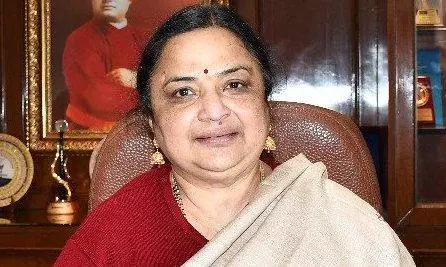
Uniformity in religion, language, dress code won’t work in India: JNU V-C
“As a university, we should be above all this. For us, seeking knowledge is important. The nation is not for one particular community,” says Santishree D Pandit

Uniformity in religion, race, language, or dress code would not work in India, as the nation is not for one particular community, JNU Vice-Chancellor Santishree D Pandit has said.
In an interaction with the editors of news agency PTI at the agency’s headquarters in Delhi, Pandit said educational institutions should respect individual choices and allow those wanting to wear a hijab to do so.
Language issue
“I would not agree on uniformity in either religion, race or language. One language should not be imposed. If some people want to change it (official language) to Hindi in some states, they can. But in the South, it will be difficult... in East India, even in Maharashtra, I don’t think Hindi is acceptable,” she said.
“I would rather say that Hindi can be there, but I don’t think a single language should be imposed. Both (Jawaharlal) Nehru and Indira Gandhi were not fools to talk about the tri-language formula because, in India, uniformity doesn’t work in any form,” she added.
Pandit was responding to a question on the push for Hindi as a national language and one of the main mediums of instruction in teaching and learning.
“Language is a sensitive issue; one should be careful with it. If you ask me, you should go slow in having one language,” she said.
Religion and identity
Pandit also said a single identity and religion would not work in the country.
“I don’t think any one religion will work here, as these are individual issues, but people at the helm want to do this. As a university, we should be above all this. For us, seeking knowledge is important. The nation is not for one particular community.”
Emphasising the need for multilingualism, Pandit said, “I believe everybody should be multilingual because, in India, we have to celebrate cultural diversity. All languages are good. I am not against any language, but for me, I am the most comfortable in English.”
Dress codes
Asked about her views on a dress code in educational institutions, Pandit said it should be a personal choice. “I am against a dress code. I think (educational) spaces should be open. If somebody wants to wear a hijab, it’s their choice and if somebody doesn’t want to wear it, they should not be forced.”
Pandit said in JNU, some students wear shorts and some wear traditional attire. “That’s their personal choice. As long as they don’t force me to do the same, I have no problem,” she said.
The hijab row erupted in Karnataka in 2022 after six students who attended classes wearing headscarves in violation of the stipulated dress code were sent out of the government PU College in Udupi.
The then-ruling BJP in the state stood strongly in support of uniform-related rules followed by educational institutions, calling the headscarf a religious symbol, while the opposition Congress supported Muslim girls.
There were several instances in coastal Karnataka when Muslim girl students, who turned up at colleges in hijab, were not allowed into classes, and Hindu boys responded with saffron shawls as a counter to it.
Asserting that “food and clothes should be a personal choice”, Pandit said, “I don’t think institutes should make any rules on these. Individual choices should be respected.”
Kingdoms missing from history lessons
Pandit also called for a balance in the representation of different cultural histories in the Indian education system.
Pointing at a lack of representation of certain historical civilisations in the education system and the influence of Westernisation, she said, “Ignorance cannot be the base of our education system. Not everything that is Indian is bad. We have to have a sense of proportion. Take a little bit of West and India.”
As an example, Pandit pointed out the Mughals and the Cholas. “In Indian history, Mughals, who ruled for less than 200 years, occupy more than 200 pages. I am not against them; give them their place. But we have the Cholas, the longest-ruling kingdom globally, and they don’t have even half a page.”
She added that some kingdoms barely get any mention. “…Marathas, Satavahanas or the Kakatiyas, do you even know such kingdoms existed? This is because of ignorance. We need to be proud of our history. Don’t look at this from a religious lens, throw religion out. All I am asking is to give everyone space,” she said.
(With agency inputs)

